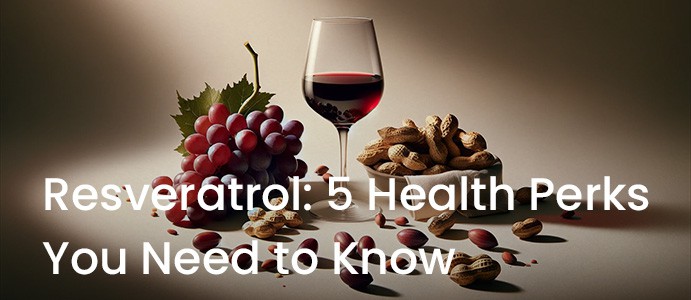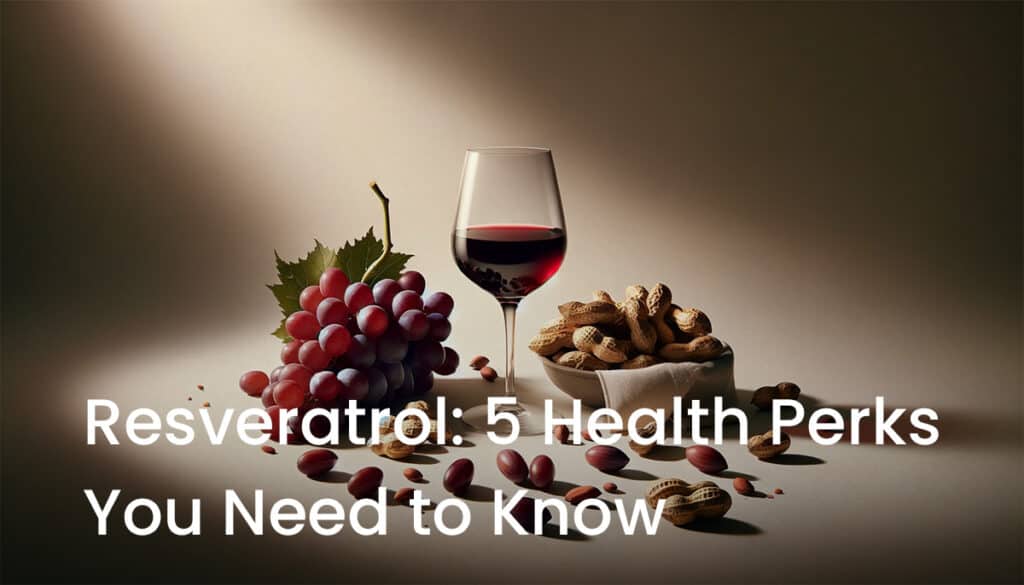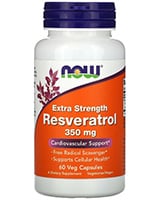

Introduction
Resveratrol, a compound found in red wine, berries, and peanuts, has garnered attention for its health benefits. While it’s commonly known for its presence in red wine, resveratrol’s health impacts extend far beyond. This article delves into five health perks of resveratrol, shedding light on its diverse and significant benefits.
Enhanced Brain Health and Cognitive Function (Benefit 1)
Resveratrol’s role in brain health is profound. It acts as a neuroprotective agent, safeguarding the brain against potential damage. One of the key ways it does this is by boosting brain-derived neurotrophic factor (BDNF), a protein integral to maintaining healthy brain cells and function. BDNF is essential for memory, learning, and cognitive flexibility. Studies indicate that resveratrol’s influence on BDNF not only helps in preserving cognitive functions but may also aid in improving them[1]Tu, W., Song, M., & Fan, X. (2023). Does resveratrol improve cognition in humans? A scientometric study to an in-depth review. CNS Neuroscience & Therapeutics, 29(9), 2413-2429. https://doi.org/10.1111/cns.14276. This makes resveratrol a potential ally in the fight against cognitive decline and neurodegenerative diseases.
Cardiovascular Benefits (Benefit 2)
Resveratrol significantly contributes to cardiovascular health. Its ability to improve heart function is notable, particularly in how it manages blood pressure and cholesterol levels[2]Bonnefont-Rousselot, D. (2016). Resveratrol and Cardiovascular Diseases. Nutrients, 8(5), 250. https://doi.org/10.3390/nu8050250. By promoting the relaxation of blood vessels, resveratrol effectively reduces the pressure exerted on artery walls, a key factor in managing hypertension. Additionally, it influences cholesterol by reducing the oxidation of LDL (bad cholesterol) and increasing HDL (good cholesterol), thereby playing a crucial role in preventing plaque buildup and arterial damage.
Potential Anti-Cancer Properties (Benefit 3)
The anti-cancer properties of resveratrol are among its most compelling benefits. Research indicates that resveratrol can intervene in various stages of cancer development, including initiation, promotion, and progression[3]Salehi, B., Mishra, A. P., Nigam, M., Sener, B., Kilic, M., Sharifi-Rad, M., Tsouh Fokou, P. V., Martins, N., & Sharifi-Rad, J. (2018). Resveratrol: A Double-Edged Sword in Health Benefits. Biomedicines, 6(3), 91. https://doi.org/10.3390/biomedicines6030091. Its anti-inflammatory and antioxidant capabilities are central to this effect. By neutralizing free radicals and reducing inflammation, resveratrol helps protect cells from the kind of damage that can lead to cancer. These properties, combined with its ability to influence cell cycle regulation, make resveratrol a promising candidate in cancer prevention and adjunctive treatment strategies.
Anti-Aging and Longevity (Benefit 4)
Resveratrol’s potential in promoting anti-aging and longevity is a fascinating aspect of its health benefits. It mimics the effects of calorie restriction, a known factor in extending lifespan. This compound activates specific genes that play a role in warding off the diseases associated with aging. Studies have shown that resveratrol can influence the biological pathways involved in aging, thereby potentially extending lifespan and improving the quality of life in later years[4]Zhou, D.-D., Luo, M., Huang, S.-Y., Saimaiti, A., Shang, A., Gan, R.-Y., & Li, H.-B. (2021). Effects and Mechanisms of Resveratrol on Aging and Age-Related Diseases. Oxidative Medicine and Cellular Longevity, 2021, Article 9932218. https://doi.org/10.1155/2021/9932218. Its impact on age-related diseases further underscores its role in promoting a healthier, longer life.
Blood Sugar Regulation and Diabetes Management (Benefit 5)
The fifth benefit of resveratrol lies in its ability to regulate blood sugar and aid in diabetes management. Resveratrol improves insulin sensitivity, which is crucial for managing blood sugar levels, especially in individuals with type 2 diabetes[5]Zhu, X., Wu, C., Qiu, S., Yuan, X., & Li, L. (2017). Effects of resveratrol on glucose control and insulin sensitivity in subjects with type 2 diabetes: Systematic review and meta-analysis. Nutrition & Metabolism, 14, 60. https://doi.org/10.1186/s12986-017-0217-z. By influencing the way the body responds to insulin, it helps in maintaining a healthy blood sugar balance. Additionally, resveratrol’s anti-inflammatory properties contribute to its effectiveness in managing diabetes, as inflammation is a known factor in the development and progression of the disease.
Conclusion
Resveratrol offers a range of health benefits, from enhancing brain health and cognitive function to playing a significant role in cardiovascular health, cancer prevention, anti-aging, and diabetes management. Its diverse effects make it a valuable component of a health-conscious lifestyle. While further research is ongoing, the current evidence suggests that incorporating resveratrol into your diet could be a step towards better health and longevity.
Buy Resveratrol Online Review Comparison Table
 Resveratrol Capsules | iHerb | 60 pills (350 mg) | $19.71 |  Worldwide, AU | Visit Website >> |
References
| ↑1 | Tu, W., Song, M., & Fan, X. (2023). Does resveratrol improve cognition in humans? A scientometric study to an in-depth review. CNS Neuroscience & Therapeutics, 29(9), 2413-2429. https://doi.org/10.1111/cns.14276 |
|---|---|
| ↑2 | Bonnefont-Rousselot, D. (2016). Resveratrol and Cardiovascular Diseases. Nutrients, 8(5), 250. https://doi.org/10.3390/nu8050250 |
| ↑3 | Salehi, B., Mishra, A. P., Nigam, M., Sener, B., Kilic, M., Sharifi-Rad, M., Tsouh Fokou, P. V., Martins, N., & Sharifi-Rad, J. (2018). Resveratrol: A Double-Edged Sword in Health Benefits. Biomedicines, 6(3), 91. https://doi.org/10.3390/biomedicines6030091 |
| ↑4 | Zhou, D.-D., Luo, M., Huang, S.-Y., Saimaiti, A., Shang, A., Gan, R.-Y., & Li, H.-B. (2021). Effects and Mechanisms of Resveratrol on Aging and Age-Related Diseases. Oxidative Medicine and Cellular Longevity, 2021, Article 9932218. https://doi.org/10.1155/2021/9932218 |
| ↑5 | Zhu, X., Wu, C., Qiu, S., Yuan, X., & Li, L. (2017). Effects of resveratrol on glucose control and insulin sensitivity in subjects with type 2 diabetes: Systematic review and meta-analysis. Nutrition & Metabolism, 14, 60. https://doi.org/10.1186/s12986-017-0217-z |

Leave a Reply